homepage news
Puerto Rico HIV/AIDS groups struggling to recover from Maria
Infection rate among the highest in U.S.
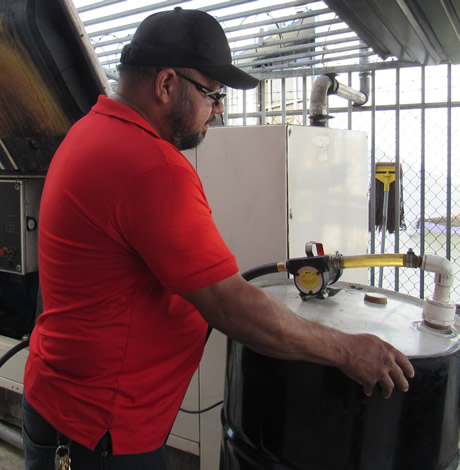
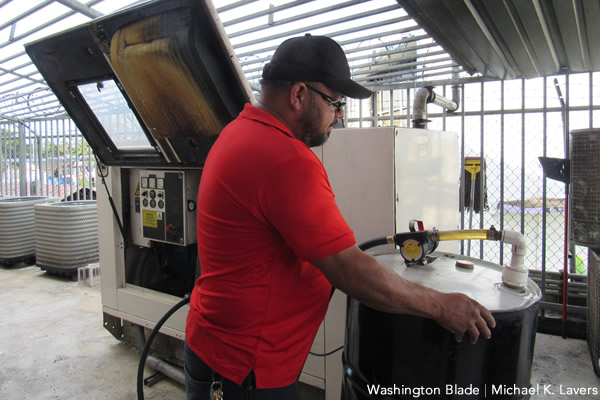
An employee of Bill’s Kitchen, a San Juan-based organization that prepares meals for people with HIV/AIDS, puts diesel into a generator on Jan. 30, 2018. Utility crews the next day restored electricity to Bill’s Kitchen, which had had not had power since Hurricane Irma brushed Puerto Rico on Sept. 7, 2017. (Washington Blade photo by Michael K. Lavers)
The generator — which broke down the week before — has powered one of Bill’s Kitchen’s two walk-in freezers and the top two floors of its building in San Juan’s Hato Rey neighborhood since the day before Hurricane Maria devastated Puerto Rico on Sept. 20. Bill’s Kitchen Executive Director Sandy Torres insisted the Washington Blade take a picture of her employee refilling the generator. She also described him as “our star employee, handyman, mechanic, inventor.”
“If anything happens, he is there,” said Torres.
A lack of electricity is one of the multitude of problems that Bill’s Kitchen and other HIV/AIDS service providers in Puerto Rico continue to face nearly five months after Maria.
People with HIV/AIDS in the days immediately after Maria were unable to receive their medications because their clinics were closed or they could not get to them because of flooding, damaged roads or a lack of transportation. Fallen trees and other debris prevented some of them from leaving their homes.
San Juan Mayor Carmen Yulín Cruz told the Blade during an interview in D.C. last November that a clinic the San Juan Department of Health operates reopened two weeks after Maria and was able to distribute medication, food and water to patients.
The Puerto Rico Community Network for Clinical Research (PR CoNCRA), an HIV/AIDS service organization that is based near the main campus of the University of Puerto Rico in Río Piedras, reopened a week after Maria. PR CoNCRA Executive Director Rosaura López-Fontánez told the Blade on Jan. 30 that her clients were able to receive their medications because Caridad, a Puerto Rican pharmacy chain, had a space inside the organization.
Ivette González of Asamblea Permanente de Personas Infectadas y Afectadas con VIH/SIDA de Puerto Rico (APPIA), told the Blade on Feb. 3 during an interview in Old San Juan that people with HIV/AIDS who live outside of the Puerto Rican capital had a more difficult time receiving their medications after Maria.
“In San Juan we had access to medications,” said González.
González, who lives with HIV and advises Cruz on her administration’s response to the epidemic, told the Blade that one of the immediate challenges after Maria was getting people with HIV/AIDS back into treatment.
She said APPIA worked with Merck, the Puerto Rico Department of Health’s AIDS Drug Assistance Program and the local planning council that allocates Ryan White Comprehensive AIDS Resources Emergency (CARE) Act funds to San Juan and other municipalities in Puerto Rico determine which clinics were able to operate. González told the Blade radios were the only “functioning means of communication” after Maria.
“If their clinic was not available, the patient was directed and referred to where they should be,” she said. “The important thing was to re-link the patient to their health care.”
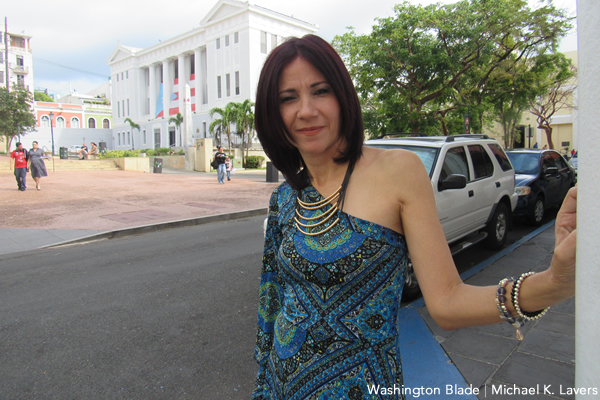
Ivette González of Asamblea Permanente de Personas Infectadas y Afectadas con VIH/SIDA de Puerto Rico (APPIA) advises San Juan Mayor Carmen Yulín Cruz on her city’s response to HIV/AIDS. (Washington Blade photo by Michael K. Lavers)
“All of this affected us,” she told the Blade. “As a result it made our work much more difficult.”
Hurricane damaged offices, equipment
Maria also damaged many of the facilities and equipment the HIV/AIDS service organizations used.
López-Fontánez told the Blade during a previous interview that PR CoNCRA “lost” more than $250,000 in equipment and medication.
Several feet of water flooded the first floor of the building in which PR CoNCRA’s offices are located. Maria also damaged its sewage and electrical systems.
“We are still finding things,” López-Fontánez told the Blade on Jan. 30 as Anselmo Fonseca of Pacientes de Sida Pro Política Sana, a San Juan-based HIV/AIDS service organization, sat next to her in PR CoNCRA’s conference room.
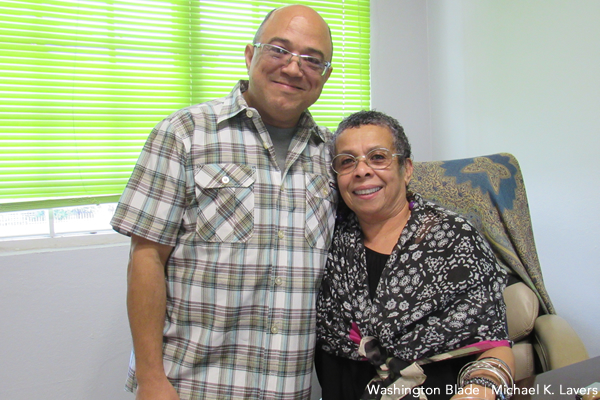
From left: Anselmo Fonseca of Pacientes de Sida Pro Política Sana and Puerto Rico Community Network for Clinical Research Executive Director Rosaura López-Fontánez in López-Fontánez’s office in Río Piedras, Puerto Rico, on Jan. 30, 2018. (Washington Blade photo by Michael K. Lavers)
Fumes from Bill’s Kitchen’s large generator forced its administrative staff to convert a second floor conference room into a makeshift office. Humidity and a lack of air conditioning made the building’s first floor offices damp.
A small generator provided electricity to the first floor until it was turned off at 4:30 p.m. It powered lights, fans that staff were using in their offices and a room with Internet access that had a small air conditioner conversion unit on the wall.
“You see the way that we are working here,” Torres told the Blade. “You can smell the humidity.”
Maria damaged the door to AIDS Healthcare Foundation’s new clinic in the municipality of Trujillo Alto that is under construction.
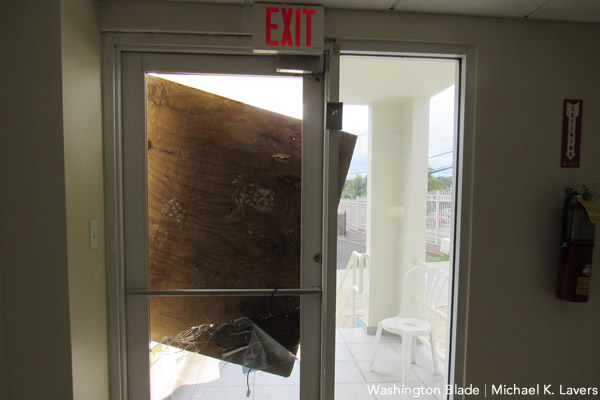
Hurricane Maria damaged the door of AIDS Healthcare Foundation’s new clinic that is under construction in Trujillo Alto, Puerto Rico. (Washington Blade photo by Michael K. Lavers)
The inside of the facility, which will include a pharmacy and exam rooms, was undamaged.
HIV/AIDS organizations distributed food, generators after Maria
HIV/AIDS service organizations in the San Juan metropolitan area also became staging areas for relief supplies after Maria.
AIDS Healthcare Foundation distributed generators and packages from its existing Trujillo Alto clinic that is located on the campus of a drug rehabilitation center. It also provided drinking water and other supplies to clients and local residents.
Cruz’s administration worked with AIDS Healthcare Foundation to deliver roughly 150 generators to people with HIV/AIDS after Maria. González told the Blade that APPIA, AIDS Healthcare Foundation and Cruz’s administration also provided assistance to HIV/AIDS service organizations, domestic and gender-based violence groups and children’s homes outside of San Juan.
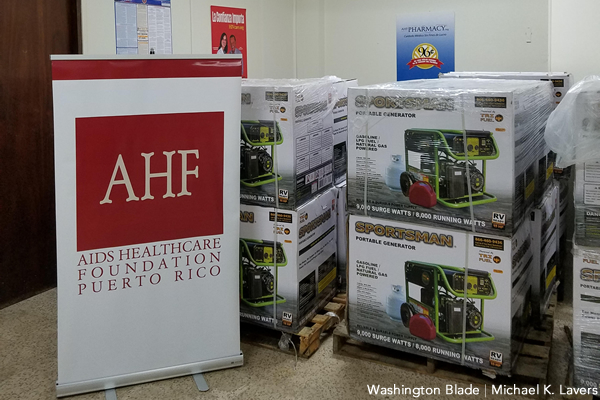
AIDS Healthcare Foundation distributed generators from its clinic in Trujillo Alto, Puerto Rico, after Hurricane Maria. (Photo courtesy of Ariel Negron/AIDS Healthcare Foundation)
“She was so amazed that there was water here,” said Negron.
Bill’s Kitchen did not have electricity from Sept. 7 until it was restored on Jan. 31. The organization in the weeks and months after Maria prepared meals for PR CoNCRA clients and staff, doctors who were volunteering in the municipality of Toa Alta, which is roughly 15 miles southwest of San Juan, and elderly people who could not leave their apartments in high-rise buildings near their San Juan offices because of the lack of power.
Bill’s Kitchen also delivered portable gas stoves to their clients and replaced mattresses and beds that Maria damaged.
López-Fontánez said a woman who lives next to PR CoNCRA’s offices “lost everything” during Maria. She told the Blade she gave her an old couch that she had in her home, while another PR CoNCRA staffer brought her a mattress.
“We all gathered,” said López-Fontánez.
Island was ‘in a disaster for a long, long time’ before Maria
Puerto Rico has one of the highest HIV/AIDS infection rates in the U.S. People with HIV/AIDS were vulnerable before Maria because of a combination of factors that include a lack of resources to fight the epidemic and Puerto Rico’s debt crisis.
The U.S. commonwealth’s economy had been in recession for more than a decade before Maria. Puerto Rico’s power grid had also fallen into disrepair.
“People blame Maria for all the disaster,” López-Fontánez told the Blade. “Yes, it caused a lot of disaster, but this country as in a disaster for a long, long time. What Maria did it just said . . . now you can see it better.”
Fonseca added Maria “pulled back the veil.”
González told the Blade that Puerto Ricans with HIV/AIDS “did not have access to medications” in 2006, 2017 and 2012. She also noted advocates and service providers “practically had to protest in the street asking for our medications.”
González said the situation for people with HIV/AIDS in San Juan has improved since Cruz took office in 2013. González nevertheless told the Blade the Puerto Rican government “thinks the problem has been resolved because there are medications.”
“We continue to stereotype and stigmatize HIV with the gay community,” she added. “It is one of the challenges that we have in Puerto Rico.”
Ponce Mayor María “Mayita” Meléndez on Feb. 2 noted to the Blade that she has urged the federal government to restore Ryan White CARE Act funds her city used to provide medications and other care to people with HIV/AIDS. Torres and other service providers with whom the Blade spoke said Maria has made navigating local and federal bureaucracies even more challenging.
“Puerto Rico is a very polarized country,” said González. “Sometimes your party affiliation dictates your objectivity, but the reality is that if you are looking at the situation objectively, the federal government has been very slow and what little has been done has been very limited in helping Puerto Ricans in need.”
‘People have lost it’
Cruz and many of the HIV/AIDS service providers with whom the Blade spoke remain highly critical of how the federal and Puerto Rican governments have responded to Maria. The slow response continues to take a toll on Puerto Ricans with HIV/AIDS and those who provide services to them.
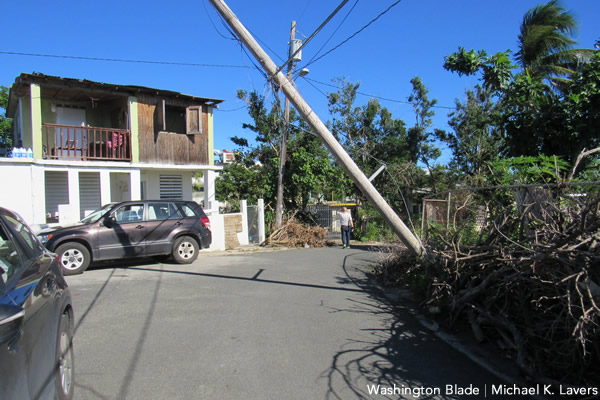
A utility pole rests precariously on a power line in Vieques, Puerto Rico, on Jan. 31, 2018. Damaged power lines and piles of debris are common sights on the island and throughout Puerto Rico in the wake of Hurricane Maria. (Washington Blade photo by Michael K. Lavers)
“You have to remember that this was also happening before the hurricanes,” added Manuel Quiñones, a PR CoNCRA case manager who shares an office with Tamayo that had several feet of water in it after Maria. “This is like the last push to go to the states.”
The Federal Emergency Management Agency denied Fonseca’s claim to fix the roof of his house near Trujillo Alto because the woman with whom he filled out the application said it was not his primary residence. López-Fontánez said the more than $120,000 in private donations that PR CoNCRA has received since Maria has allowed her organization to continue to operate.
Torres told the Blade she used private funding to hire a psychologist who provides support to Bill’s Kitchen’s clients and staff.
PR CoNCRA’s electricity was restored two weeks after Maria because it is near a hospital, but López-Fontánez said it “goes and comes.” She and Torres told the Blade that several of PR CoNCRA and Bill’s Kitchen’s clients and employees still have no electricity or water.
“That’s so difficult,” said López-Fontánez. “What it has done is that people have lost it.”
González told the Blade the electricity at her home in San Juan’s Puerto Nuevo neighborhood was restored less than a month ago.
The D.C.-based Food and Friends bought Bill’s Kitchen a new generator to replace the old one. Torres told the Blade that she plans to pick up the new generator on Thursday and hopes it will be installed this week.
A fire at a substation on Sunday caused a blackout that impacted Bill’s Kitchen, PR CoNCRA and large parts of the San Juan metropolitan area and northeastern Puerto Rico. Power was restored to Bill’s Kitchen and PR CoNCRA a few hours later.
“The country is in a horrible crisis,” González told the Blade. “We had a disaster, a catastrophe and there are still people who don’t understand the level of attention this requires.”
Editor’s note: Puerto Rico’s HIV/AIDS service organizations continue to seek donations that will allow them to serve their clients and repair damage they suffered during Maria. Information on how to contribute to them is below.
homepage news
Honoring the legacy of New Orleans’ 1973 UpStairs Lounge fire
Why the arson attack that killed 32 gay men still resonates 50 years later

On June 23 of last year, I held the microphone as a gay man in the New Orleans City Council Chamber and related a lost piece of queer history to the seven council members. I told this story to disabuse all New Orleanians of the notion that silence and accommodation, in the face of institutional and official failures, are a path to healing.
The story I related to them began on a typical Sunday night at a second-story bar on the fringe of New Orleans’ French Quarter in 1973, where working-class men would gather around a white baby grand piano and belt out the lyrics to a song that was the anthem of their hidden community, “United We Stand” by the Brotherhood of Man.
“United we stand,” the men would sing together, “divided we fall” — the words epitomizing the ethos of their beloved UpStairs Lounge bar, an egalitarian free space that served as a forerunner to today’s queer safe havens.
Around that piano in the 1970s Deep South, gays and lesbians, white and Black queens, Christians and non-Christians, and even early gender minorities could cast aside the racism, sexism, and homophobia of the times to find acceptance and companionship for a moment.
For regulars, the UpStairs Lounge was a miracle, a small pocket of acceptance in a broader world where their very identities were illegal.
On the Sunday night of June 24, 1973, their voices were silenced in a murderous act of arson that claimed 32 lives and still stands as the deadliest fire in New Orleans history — and the worst mass killing of gays in 20th century America.
As 13 fire companies struggled to douse the inferno, police refused to question the chief suspect, even though gay witnesses identified and brought the soot-covered man to officers idly standing by. This suspect, an internally conflicted gay-for-pay sex worker named Rodger Dale Nunez, had been ejected from the UpStairs Lounge screaming the word “burn” minutes before, but New Orleans police rebuffed the testimony of fire survivors on the street and allowed Nunez to disappear.
As the fire raged, police denigrated the deceased to reporters on the street: “Some thieves hung out there, and you know this was a queer bar.”
For days afterward, the carnage met with official silence. With no local gay political leaders willing to step forward, national Gay Liberation-era figures like Rev. Troy Perry of the Metropolitan Community Church flew in to “help our bereaved brothers and sisters” — and shatter officialdom’s code of silence.
Perry broke local taboos by holding a press conference as an openly gay man. “It’s high time that you people, in New Orleans, Louisiana, got the message and joined the rest of the Union,” Perry said.
Two days later, on June 26, 1973, as families hesitated to step forward to identify their kin in the morgue, UpStairs Lounge owner Phil Esteve stood in his badly charred bar, the air still foul with death. He rebuffed attempts by Perry to turn the fire into a call for visibility and progress for homosexuals.
“This fire had very little to do with the gay movement or with anything gay,” Esteve told a reporter from The Philadelphia Inquirer. “I do not want my bar or this tragedy to be used to further any of their causes.”
Conspicuously, no photos of Esteve appeared in coverage of the UpStairs Lounge fire or its aftermath — and the bar owner also remained silent as he witnessed police looting the ashes of his business.
“Phil said the cash register, juke box, cigarette machine and some wallets had money removed,” recounted Esteve’s friend Bob McAnear, a former U.S. Customs officer. “Phil wouldn’t report it because, if he did, police would never allow him to operate a bar in New Orleans again.”
The next day, gay bar owners, incensed at declining gay bar traffic amid an atmosphere of anxiety, confronted Perry at a clandestine meeting. “How dare you hold your damn news conferences!” one business owner shouted.
Ignoring calls for gay self-censorship, Perry held a 250-person memorial for the fire victims the following Sunday, July 1, culminating in mourners defiantly marching out the front door of a French Quarter church into waiting news cameras. “Reverend Troy Perry awoke several sleeping giants, me being one of them,” recalled Charlene Schneider, a lesbian activist who walked out of that front door with Perry.

Esteve doubted the UpStairs Lounge story’s capacity to rouse gay political fervor. As the coroner buried four of his former patrons anonymously on the edge of town, Esteve quietly collected at least $25,000 in fire insurance proceeds. Less than a year later, he used the money to open another gay bar called the Post Office, where patrons of the UpStairs Lounge — some with visible burn scars — gathered but were discouraged from singing “United We Stand.”
New Orleans cops neglected to question the chief arson suspect and closed the investigation without answers in late August 1973. Gay elites in the city’s power structure began gaslighting the mourners who marched with Perry into the news cameras, casting suspicion on their memories and re-characterizing their moment of liberation as a stunt.
When a local gay journalist asked in April 1977, “Where are the gay activists in New Orleans?,” Esteve responded that there were none, because none were needed. “We don’t feel we’re discriminated against,” Esteve said. “New Orleans gays are different from gays anywhere else… Perhaps there is some correlation between the amount of gay activism in other cities and the degree of police harassment.”

An attitude of nihilism and disavowal descended upon the memory of the UpStairs Lounge victims, goaded by Esteve and fellow gay entrepreneurs who earned their keep via gay patrons drowning their sorrows each night instead of protesting the injustices that kept them drinking.
Into the 1980s, the story of the UpStairs Lounge all but vanished from conversation — with the exception of a few sanctuaries for gay political debate such as the local lesbian bar Charlene’s, run by the activist Charlene Schneider.
By 1988, the 15th anniversary of the fire, the UpStairs Lounge narrative comprised little more than a call for better fire codes and indoor sprinklers. UpStairs Lounge survivor Stewart Butler summed it up: “A tragedy that, as far as I know, no good came of.”
Finally, in 1991, at Stewart Butler and Charlene Schneider’s nudging, the UpStairs Lounge story became aligned with the crusade of liberated gays and lesbians seeking equal rights in Louisiana. The halls of power responded with intermittent progress. The New Orleans City Council, horrified by the story but not yet ready to take its look in the mirror, enacted an anti-discrimination ordinance protecting gays and lesbians in housing, employment, and public accommodations that Dec. 12 — more than 18 years after the fire.
“I believe the fire was the catalyst for the anger to bring us all to the table,” Schneider told The Times-Picayune, a tacit rebuke to Esteve’s strategy of silent accommodation. Even Esteve seemed to change his stance with time, granting a full interview with the first UpStairs Lounge scholar Johnny Townsend sometime around 1989.
Most of the figures in this historic tale are now deceased. What’s left is an enduring story that refused to go gently. The story now echoes around the world — a musical about the UpStairs Lounge fire recently played in Tokyo, translating the gay underworld of the 1973 French Quarter for Japanese audiences.
When I finished my presentation to the City Council last June, I looked up to see the seven council members in tears. Unanimously, they approved a resolution acknowledging the historic failures of city leaders in the wake of the UpStairs Lounge fire.
Council members personally apologized to UpStairs Lounge families and survivors seated in the chamber in a symbolic act that, though it could not bring back those who died, still mattered greatly to those whose pain had been denied, leaving them to grieve alone. At long last, official silence and indifference gave way to heartfelt words of healing.
The way Americans remember the past is an active, ongoing process. Our collective memory is malleable, but it matters because it speaks volumes about our maturity as a people, how we acknowledge the past’s influence in our lives, and how it shapes the examples we set for our youth. Do we grapple with difficult truths, or do we duck accountability by defaulting to nostalgia and bluster? Or worse, do we simply ignore the past until it fades into a black hole of ignorance and indifference?
I believe that a factual retelling of the UpStairs Lounge tragedy — and how, 50 years onward, it became known internationally — resonates beyond our current divides. It reminds queer and non-queer Americans that ignoring the past holds back the present, and that silence is no cure for what ails a participatory nation.
Silence isolates. Silence gaslights and shrouds. It preserves the power structures that scapegoat the disempowered.
Solidarity, on the other hand, unites. Solidarity illuminates a path forward together. Above all, solidarity transforms the downtrodden into a resounding chorus of citizens — in the spirit of voices who once gathered ‘round a white baby grand piano and sang, joyfully and loudly, “United We Stand.”

Robert W. Fieseler is a New Orleans-based journalist and the author of “Tinderbox: the Untold Story of the Up Stairs Lounge Fire and the Rise of Gay Liberation.”
homepage news
New Supreme Court term includes critical LGBTQ case with ‘terrifying’ consequences
Business owner seeks to decline services for same-sex weddings

The U.S. Supreme Court, after a decision overturning Roe v. Wade that still leaves many reeling, is starting a new term with justices slated to revisit the issue of LGBTQ rights.
In 303 Creative v. Elenis, the court will return to the issue of whether or not providers of custom-made goods can refuse service to LGBTQ customers on First Amendment grounds. In this case, the business owner is Lorie Smith, a website designer in Colorado who wants to opt out of providing her graphic design services for same-sex weddings despite the civil rights law in her state.
Jennifer Pizer, acting chief legal officer of Lambda Legal, said in an interview with the Blade, “it’s not too much to say an immeasurably huge amount is at stake” for LGBTQ people depending on the outcome of the case.
“This contrived idea that making custom goods, or offering a custom service, somehow tacitly conveys an endorsement of the person — if that were to be accepted, that would be a profound change in the law,” Pizer said. “And the stakes are very high because there are no practical, obvious, principled ways to limit that kind of an exception, and if the law isn’t clear in this regard, then the people who are at risk of experiencing discrimination have no security, no effective protection by having a non-discrimination laws, because at any moment, as one makes their way through the commercial marketplace, you don’t know whether a particular business person is going to refuse to serve you.”
The upcoming arguments and decision in the 303 Creative case mark a return to LGBTQ rights for the Supreme Court, which had no lawsuit to directly address the issue in its previous term, although many argued the Dobbs decision put LGBTQ rights in peril and threatened access to abortion for LGBTQ people.
And yet, the 303 Creative case is similar to other cases the Supreme Court has previously heard on the providers of services seeking the right to deny services based on First Amendment grounds, such as Masterpiece Cakeshop and Fulton v. City of Philadelphia. In both of those cases, however, the court issued narrow rulings on the facts of litigation, declining to issue sweeping rulings either upholding non-discrimination principles or First Amendment exemptions.
Pizer, who signed one of the friend-of-the-court briefs in opposition to 303 Creative, said the case is “similar in the goals” of the Masterpiece Cakeshop litigation on the basis they both seek exemptions to the same non-discrimination law that governs their business, the Colorado Anti-Discrimination Act, or CADA, and seek “to further the social and political argument that they should be free to refuse same-sex couples or LGBTQ people in particular.”
“So there’s the legal goal, and it connects to the social and political goals and in that sense, it’s the same as Masterpiece,” Pizer said. “And so there are multiple problems with it again, as a legal matter, but also as a social matter, because as with the religion argument, it flows from the idea that having something to do with us is endorsing us.”
One difference: the Masterpiece Cakeshop litigation stemmed from an act of refusal of service after owner, Jack Phillips, declined to make a custom-made wedding cake for a same-sex couple for their upcoming wedding. No act of discrimination in the past, however, is present in the 303 Creative case. The owner seeks to put on her website a disclaimer she won’t provide services for same-sex weddings, signaling an intent to discriminate against same-sex couples rather than having done so.
As such, expect issues of standing — whether or not either party is personally aggrieved and able bring to a lawsuit — to be hashed out in arguments as well as whether the litigation is ripe for review as justices consider the case. It’s not hard to see U.S. Chief Justice John Roberts, who has sought to lead the court to reach less sweeping decisions (sometimes successfully, and sometimes in the Dobbs case not successfully) to push for a decision along these lines.
Another key difference: The 303 Creative case hinges on the argument of freedom of speech as opposed to the two-fold argument of freedom of speech and freedom of religious exercise in the Masterpiece Cakeshop litigation. Although 303 Creative requested in its petition to the Supreme Court review of both issues of speech and religion, justices elected only to take up the issue of free speech in granting a writ of certiorari (or agreement to take up a case). Justices also declined to accept another question in the petition request of review of the 1990 precedent in Smith v. Employment Division, which concluded states can enforce neutral generally applicable laws on citizens with religious objections without violating the First Amendment.
Representing 303 Creative in the lawsuit is Alliance Defending Freedom, a law firm that has sought to undermine civil rights laws for LGBTQ people with litigation seeking exemptions based on the First Amendment, such as the Masterpiece Cakeshop case.
Kristen Waggoner, president of Alliance Defending Freedom, wrote in a Sept. 12 legal brief signed by her and other attorneys that a decision in favor of 303 Creative boils down to a clear-cut violation of the First Amendment.
“Colorado and the United States still contend that CADA only regulates sales transactions,” the brief says. “But their cases do not apply because they involve non-expressive activities: selling BBQ, firing employees, restricting school attendance, limiting club memberships, and providing room access. Colorado’s own cases agree that the government may not use public-accommodation laws to affect a commercial actor’s speech.”
Pizer, however, pushed back strongly on the idea a decision in favor of 303 Creative would be as focused as Alliance Defending Freedom purports it would be, arguing it could open the door to widespread discrimination against LGBTQ people.
“One way to put it is art tends to be in the eye of the beholder,” Pizer said. “Is something of a craft, or is it art? I feel like I’m channeling Lily Tomlin. Remember ‘soup and art’? We have had an understanding that whether something is beautiful or not is not the determining factor about whether something is protected as artistic expression. There’s a legal test that recognizes if this is speech, whose speech is it, whose message is it? Would anyone who was hearing the speech or seeing the message understand it to be the message of the customer or of the merchants or craftsmen or business person?”
Despite the implications in the case for LGBTQ rights, 303 Creative may have supporters among LGBTQ people who consider themselves proponents of free speech.
One joint friend-of-the-court brief before the Supreme Court, written by Dale Carpenter, a law professor at Southern Methodist University who’s written in favor of LGBTQ rights, and Eugene Volokh, a First Amendment legal scholar at the University of California, Los Angeles, argues the case is an opportunity to affirm the First Amendment applies to goods and services that are uniquely expressive.
“Distinguishing expressive from non-expressive products in some contexts might be hard, but the Tenth Circuit agreed that Smith’s product does not present a hard case,” the brief says. “Yet that court (and Colorado) declined to recognize any exemption for products constituting speech. The Tenth Circuit has effectively recognized a state interest in subjecting the creation of speech itself to antidiscrimination laws.”
Oral arguments in the case aren’t yet set, but may be announced soon. Set to defend the state of Colorado and enforcement of its non-discrimination law in the case is Colorado Solicitor General Eric Reuel Olson. Just this week, the U.S. Supreme Court announced it would grant the request to the U.S. solicitor general to present arguments before the justices on behalf of the Biden administration.
With a 6-3 conservative majority on the court that has recently scrapped the super-precedent guaranteeing the right to abortion, supporters of LGBTQ rights may think the outcome of the case is all but lost, especially amid widespread fears same-sex marriage would be next on the chopping block. After the U.S. Tenth Circuit Court of Appeals ruled against 303 Creative in the lawsuit, the simple action by the Supreme Court to grant review in the lawsuit suggests they are primed to issue a reversal and rule in favor of the company.
Pizer, acknowledging the call to action issued by LGBTQ groups in the aftermath of the Dobbs decision, conceded the current Supreme Court issuing the ruling in this case is “a terrifying prospect,” but cautioned the issue isn’t so much the makeup of the court but whether or not justices will continue down the path of abolishing case law.
“I think the question that we’re facing with respect to all of the cases or at least many of the cases that are in front of the court right now, is whether this court is going to continue on this radical sort of wrecking ball to the edifice of settled law and seemingly a goal of setting up whole new structures of what our basic legal principles are going to be. Are we going to have another term of that?” Pizer said. “And if so, that’s terrifying.”
homepage news
Kelley Robinson, a Black, queer woman, named president of Human Rights Campaign
Progressive activist a veteran of Planned Parenthood Action Fund

Kelley Robinson, a Black, queer woman and veteran of Planned Parenthood Action Fund, is to become the next president of the Human Rights Campaign, the nation’s leading LGBTQ group announced on Tuesday.
Robinson is set to become the ninth president of the Human Rights Campaign after having served as executive director of Planned Parenthood Action Fund and more than 12 years of experience as a leader in the progressive movement. She’ll be the first Black, queer woman to serve in that role.
“I’m honored and ready to lead HRC — and our more than three million member-advocates — as we continue working to achieve equality and liberation for all Lesbian, Gay, Bisexual, Transgender, and Queer people,” Robinson said. “This is a pivotal moment in our movement for equality for LGBTQ+ people. We, particularly our trans and BIPOC communities, are quite literally in the fight for our lives and facing unprecedented threats that seek to destroy us.”
The next Human Rights Campaign president is named as Democrats are performing well in polls in the mid-term elections after the U.S. Supreme Court overturned Roe v. Wade, leaving an opening for the LGBTQ group to play a key role amid fears LGBTQ rights are next on the chopping block.
“The overturning of Roe v. Wade reminds us we are just one Supreme Court decision away from losing fundamental freedoms including the freedom to marry, voting rights, and privacy,” Robinson said. “We are facing a generational opportunity to rise to these challenges and create real, sustainable change. I believe that working together this change is possible right now. This next chapter of the Human Rights Campaign is about getting to freedom and liberation without any exceptions — and today I am making a promise and commitment to carry this work forward.”
The Human Rights Campaign announces its next president after a nearly year-long search process after the board of directors terminated its former president Alphonso David when he was ensnared in the sexual misconduct scandal that led former New York Gov. Andrew Cuomo to resign. David has denied wrongdoing and filed a lawsuit against the LGBTQ group alleging racial discrimination.

-

 State Department2 days ago
State Department2 days agoState Department releases annual human rights report
-

 Maryland4 days ago
Maryland4 days agoJoe Vogel campaign holds ‘Big Gay Canvass Kickoff’
-

 Politics3 days ago
Politics3 days agoSmithsonian staff concerned about future of LGBTQ programming amid GOP scrutiny
-

 The White House1 day ago
The White House1 day agoWhite House debuts action plan targeting pollutants in drinking water












